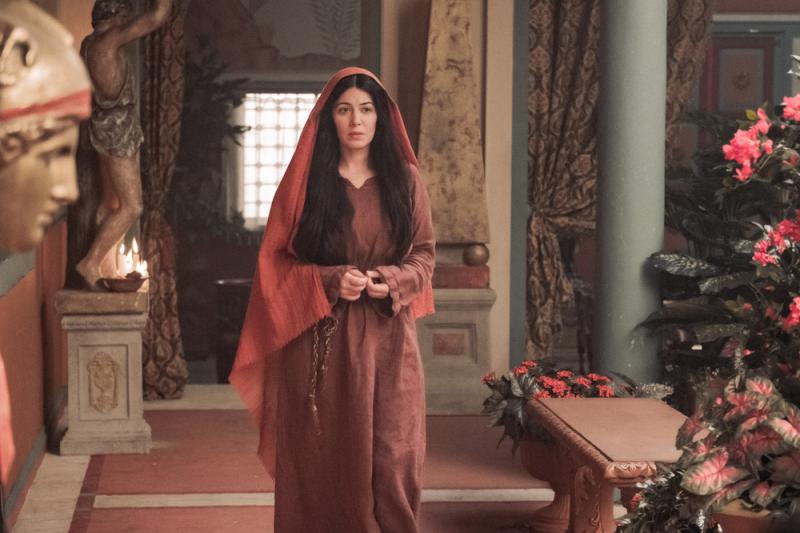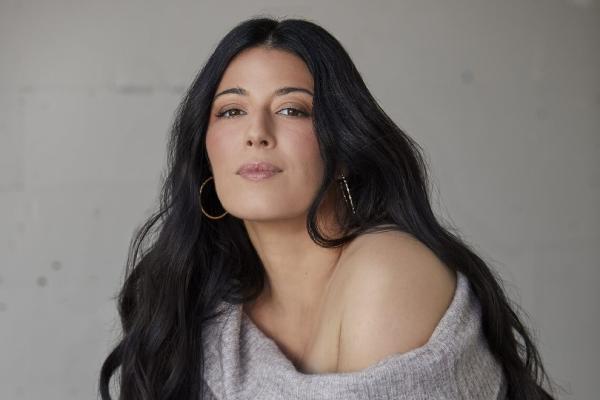In the Gospel of John, Mary Magdalene is the first person to see the risen Jesus. That means, in the brief, beautiful space between meeting the Lord and telling the disciples what she’d seen, Mary Magdalene was the whole entire church, giving rise to her identification as “the apostle to the apostles.”
“What an important and special thing for the first person to witness Jesus resurrected [be] a woman,” Elizabeth Tabish said. “Being one of his best friends, and for her to not turn away from the crucifixion, not run from it, but to stay there in witness of it. And then this beautiful reward of remaining with him to the point of seeing him resurrected. It’s just beautiful.”
Tabish plays Mary Magdalene in The Chosen, the historical drama series that turned the life of Jesus into prestige TV and against all odds became a commercial and critical smash. Season 5, which centers around the Last Supper, will hit streaming services in June, but the franchise’s inventive theatrical outings have netted over $115 million worldwide. In an era where many Christians are every bit as skeptical of big budget biblical adaptations as Hollywood studios are of Christian audiences, The Chosen managed to thread the needle. Tabish’s performance deserves no small amount of credit for the success, breathing real dimension into a character who has endured several millennia of flattening.
“There’s all sorts of fan fiction,” Tabish said of speculation over Mary’s history. “People see and believe what they want about these characters because there’s so little written about them.”
Outside of Jesus himself, Mary Magdalene is one of the most fanfic’d figures in the New Testament. She has been imaginatively cast as everything from Jesus’ secret wife in the movie’s adaptation of Dan Brown’s The Da Vinci Code to the emaciated desert ascetic as depicted in Donatello’s sculpture. The most famous and enduring bit of mythology around Mary Magdalene is the idea that she was a sex worker — a detail she likely gained from being conflated with other Marys in the Gospel. The Bible itself does not suggest Mary Magdalene was involved in sex work, but Tabish says it wouldn’t bother her if it did.
“I haven’t really cared too much either way,” she said. “It never felt particularly offensive to me if she was a prostitute. This is a woman that’s gone through so much and finds redemption. If we label her as a prostitute before all of this, so what? Who cares? Right?”
Tabish said she’s a private person, but she’s outspoken about her views. Like Mary Magdalene herself, she’s a woman who works around a lot of guys, which already puts her in a unique position. But she’s also politically progressive, which she says makes her a bit of a unicorn in Christian circles.
“It’s a very rare thing for someone to publicly discuss both Christianity and progressive politics,” she said. “But I know that there are so many people that are Christian and leftist, and I don’t know if they’re feeling represented in any way. I just want to share that there are so many, and their political beliefs in many ways are influenced by their Christianity, by their faith, and by what Jesus taught. I just think those two things go hand in hand.”
Tabish’s spiritual journey has not been straightforward. She was born in Utah and grew up frequenting the Maronite Catholic Church attended by her father’s Lebanese family, a worship experience she looks back on fondly. But things changed when her family moved to Oklahoma, where megachurch culture clashed mightily with her sense of church as an “intimate, reverent” place.
“As I got older and older, I was confronted with the power dynamics and hypocrisy in a lot of church structures,” she said. “When you read the Gospels and you read what Jesus was teaching, you have a connection to that, you love that. You want to be inspired by that and apply it to your life. But when you go to church, you’re focusing on all of our sinful nature and going to hell and the devil always being after you. And if you kiss a boy, you go to hell if you don’t go to confession. It was this information that felt at odds with what I would get from reading stories about Jesus and reading the gospels.
“That was such a distraction from the message that I just thought, ‘this isn’t for me.’”
Her belief in policies that welcome refugees and offered health care and education to all (“I love Bernie Sanders,” she told Vanity Fair) seemed to put her at odds with the Christian majority in the U.S. and contributed to a long period of feeling dismissive of religion.
Things started to change when she read the first script for The Chosen, an audition she landed after several years of scraping by on odd, one-off acting jobs. “It felt like it was this answer to a question I asked a long, long time ago, or even a prayer I made a long, long time ago: How can we express the real thing?”
In The Chosen, Mary Magdalene is a survivor of sexual assault who struggles with alcoholism, giving her a craggy humanity that Tabish inhabits with skillful emotion. Assault and substance abuse aren’t any more part of Mary’s official canon than sex work is, but the show’s writers have always been open about their own creative interpretations. This version of Mary Magdalene — bruised, prickly, and filled with an immense capacity for love — is another chapter in an ancient, ongoing evolution.
Tabish_TheChosen

Throughout the Middle Ages and through the Protestant Reformation, Mary’s association with promiscuity transformed her in the popular imagination into a woman as beautiful as she was libidinous; extravagantly wealthy, perhaps even connected to royalty, but only useful to Jesus once she brought her ravenous sexual appetite in check. Though this narrative is baseless, it proved convenient for patriarchal religious societies that found shaming sex an effective tool for keeping women in check.
In this way, Mary Magdalene was not only, as New Testament scholar Bart Ehrman has argued, “the founder of Christianity,” but also the quintessential Christian woman — a disciple who was mistreated and misunderstood because she was a woman in a community largely led by men. In her own way, Tabish can relate.
“I think being a woman in this industry has been so difficult for so long,” she says, referring to a career where she’s regularly experienced “a certain dismissiveness, a certain talking over, a certain silent request that you be seen and honored. A request that you be seen and not heard.”
Tabish notes that the cast and crew of The Chosen have a broad and diverse range of beliefs. Jonathan Roumie, who plays Jesus on the series, created a small online stir when he appeared on right-wing commentator Tucker Carlson’s show in March. There was another minor controversy in 2023, when show creator Dallas Jenkins assured fans that he believes “in a biblical viewpoint of sexuality” — a way of assuaging conservative fans’ concerns after a gay pride flag was spotted on set.
“I’ve been quietly just okay with men speaking for me and being the leaders and voices of the show, but this is my life too,” she says. “And this is my career too. When I got to a point where when someone is representing just themselves — but accidentally, seemingly, representing the show — and it doesn’t align with me, it’s a hard thing to just speak up and say, Well, that’s for you and this is for me and that’s okay.”
That’s the impulse that got Tabish to have the confidence to speak more publicly about her beliefs. “I have a voice too,” she says. “And these are the things I want to say and to share the female experience and to share at least my experience. It was very empowering, but also really hard to do.”
Tabish is gearing up to film The Chosen’s sixth season, which will finally see its central figure crucified. This sets the stage for Mary’s own meeting with Jesus at the empty tomb, an event Tabish says is her favorite story from the life of Jesus. Her other favorite is the story of the woman caught in adultery, from John 8:1-11, from which we get Jesus’ command to let those without sin cast the first stone.
“I think, to me, that is this message and lesson that I constantly return to: not judging people,” she says. “You focus on fixing yourself before you go around trying to fix everyone else. That’s a belief that would, I think, help in churches.”
Got something to say about what you're reading? We value your feedback!







